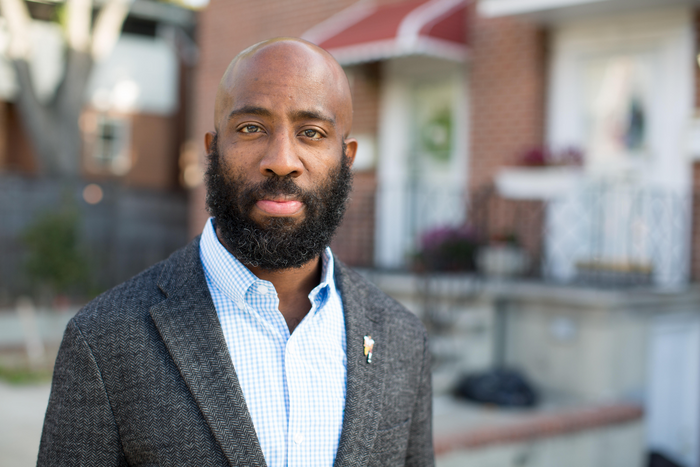February 14, 2023—BRONX, NY—Neighborhood redevelopment, which transforms low-income neighborhoods through rezoning, new construction and renovation, can lead to health benefits, such as greater access to fresh produce, improved housing, and more green spaces. But these advantages may not extend to all area residents. More information is needed about the impact of redevelopment, also known as urban renewal, on health, particularly if it contributes to inequities among middle-aged and older adults.

Credit: Albert Einstein College of Medicine
February 14, 2023—BRONX, NY—Neighborhood redevelopment, which transforms low-income neighborhoods through rezoning, new construction and renovation, can lead to health benefits, such as greater access to fresh produce, improved housing, and more green spaces. But these advantages may not extend to all area residents. More information is needed about the impact of redevelopment, also known as urban renewal, on health, particularly if it contributes to inequities among middle-aged and older adults.
Researchers led by Earle Chambers, Ph.D., M.P.H., at Albert Einstein College of Medicine and Montefiore Health System, have received a four-year, $2.9 million grant from the National Institutes of Health (NIH) to study how neighborhood redevelopment affects cardiovascular disease (CVD) among older Black and Hispanic residents in the Bronx, home to the country’s poorest urban congressional district and numerous redevelopment projects.
“Neighborhood redevelopment is a powerful tool to transform an area, but we need to learn how it affects human health, for good or ill,” said Dr. Chambers, professor and director of research in the department of family and social medicine and professor of epidemiology & population health and of psychiatry and behavioral sciences. “Montefiore Einstein is uniquely positioned to track health outcomes associated with redevelopment because so many residents of the Bronx—a focus of redevelopment activity—receive care here, allowing us to zero in on health changes to our population,” he added.
The Heart of the Matter
The study will focus on CVD, which accounts for 1 in 4 deaths in the United States and is the country’s leading cause of mortality. Well-known risk factors for CVD, such as hypertension and diabetes, typically emerge in middle age—the time of life when health inequities associated with the disease widen. CVD risk can be affected by nonmedical factors such as economic and housing stability, education level, neighborhood features, and social experiences—all of which can be influenced by redevelopment efforts.
The research team, which includes collaborators at Icahn School of Medicine at Mount Sinai, Columbia University’s Mailman School of Public Health, and the City University of New York Graduate School of Public Health & Health Policy, will use several approaches to measure the impact of both medical and nonmedical risk factors on CVD health to better understand how redevelopment affects cardiovascular health over time. With access to de-identified electronic medical records of more than 15,000 Bronx residents, the researchers will compare the prevalence of CVD events (such as heart attacks and strokes) and CVD risk factors (such as hypertension) among cohorts of mid-life and older residents of two Bronx neighborhoods: the Jerome Avenue area, which is undergoing redevelopment, and the Southern Boulevard area, which is not. Plans for Jerome Avenue include adding more than 4,000 housing units, rezoning areas to increase retail businesses, establishing new schools, and upgrading public parks.
Walking Tours and Computer Modeling
The team will also conduct walking tours on which they will meet with and survey 300 Jerome Avenue residents to better understand how their neighborhood’s ongoing redevelopment has personally affected them and their access to healthful resources. The survey will include questions about food intake and physical activity, as well as on social needs, such as residents’ housing status and economic stability.
“The combination of resources and how people perceive access to them likely contribute to their overall health and how they prioritize heart-healthy behaviors,” said Dr. Chambers.
The redevelopment study will also use computer simulation modeling to predict the long-term effects of redevelopment on CVD-related outcomes and inform future redevelopment strategies.
“Our study will help show whether or not redevelopment efforts are moving communities forward,” said Dr. Chambers. “When neighborhoods undergo redevelopment, we must be sure to honor the people who are already living in those communities and ensure everyone benefits.”
The grant, titled “Bronx Neighborhood Redevelopment and CVD in mid-life and older adults,” is funded by the National Heart, Lung, and Blood Institute, part of the NIH (1R01HL166318).
About Montefiore Health System
Montefiore Health System is one of New York’s premier academic health systems and is a recognized leader in providing exceptional quality and personalized, accountable care to approximately three million people in communities across the Bronx, Westchester, and the Hudson Valley. It is comprised of 10 hospitals, including the Children’s Hospital at Montefiore, Burke Rehabilitation Hospitaland more than 200 outpatient ambulatory care sites. The advanced clinical and translational research at its medical school, Albert Einstein College of Medicine, directly informs patient care and improves outcomes. From the Montefiore-Einstein Centers of Excellence in cancer, cardiology and vascular care, pediatrics, and transplantation, to its preeminent school-based health program, Montefiore is a fully integrated healthcare delivery system providing coordinated, comprehensive care to patients and their families. For more information, please visit www.montefiore.org. Follow us on Twitter and Instagram and LinkedIn, or view us on Facebook and YouTube.
About Albert Einstein College of Medicine
Albert Einstein College of Medicine is one of the nation’s premier centers for research, medical education and clinical investigation. During the 2022-23 academic year, Einstein is home to 740 M.D. students, 194 Ph.D. students, 118 students in the combined M.D./Ph.D. program, and approximately 225 postdoctoral research fellows. The College of Medicine has more than 1,900 full-time faculty members located on the main campus and at its clinical affiliates. In 2022, Einstein received more than $202 million in awards from the National Institutes of Health. This includes the funding of major research centers at Einstein in cancer, aging, intellectual development disorders, diabetes, clinical and translational research, liver disease, and AIDS. Other areas where the College of Medicine is concentrating its efforts include developmental brain research, neuroscience, cardiac disease, and initiatives to reduce and eliminate ethnic and racial health disparities. Its partnership with Montefiore, the University Hospital and academic medical center for Einstein, advances clinical and translational research to accelerate the pace at which new discoveries become the treatments and therapies that benefit patients. For more information, please visit einsteinmed.edu, follow us on Twitter, Facebook, Instagram, LinkedIn, and view us on YouTube.




